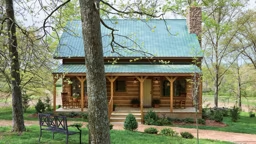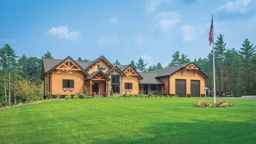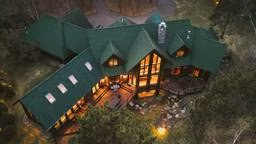
Photo: fotolia.com / lucaar
The faintest tinge of gray was lightening the night sky when my neighbor Norm woke up with the uneasy feeling that something was wrong. As he lay in bed wondering what had roused him from a sound sleep, he heard the planks of his deck groan, and then a soft thud and a grunt. Convinced there was a prowler, he eased out of bed and crept toward the window. Cautiously, he peered out just as a shaggy-haired 250-pound intruder peered in. The startled black bear took a long look, closed his jaws around the remnants of the 25-pound bag of birdseed he’d dragged out of the deck box and galloped off.
Norm doesn’t store his birdseed outside any more. Like most of us following our dreams out of the city and into the woods, Norm put lots of thought into every detail of his log home. But none at all into how to get along with the furry four-footed neighbors who already considered his property their home.
Every year, resourceful bears focused on filling their stomachs discover that their new neighbors obligingly provide a highly dependable buffet of garbage, birdseed, pet food and other calorie-laden treats hungry bears find hard to resist. And sadly, every year thousands of bears lose their lives because they became too skilled at foraging around—and sometimes in—the big hollow trees we call home.
Bears don’t have much choice about where they live, but people do. If you choose to build your log home in bear country, there are some simple precautions you can take to reduce the chances you’ll wake up one morning and find a bear on your deck—or in your kitchen.
An Open Site
If the log home of your dreams is still just a gleam in your builder’s eye, you can locate, design, build and landscape in ways that will discourage bears. If you already live in bear country, there are many simple adjustments you can make to help keep your wildlife wild. Black bears seldom venture far from cover, as their normal response to danger is to vanish into the woods or scamper up a tree. To discourage bear exploration, pick a building site out in the open, away from meadow edges, streams and obvious wildlife trails.
Eau de Garbage
Bears are often attracted to our homes by things we leave outside that smell good or look familiar. Eau de garbage is a heady perfume a bear’s super sensitive nose can detect from miles away. Some thought about what you’re going to do with your trash can prevent a lot of problems—for you and the bears. Decks and patios are often home to barbecue grills. Grills smell like food long after the burgers are gone, so if you can design a simple way to roll your grill inside, you can avoid tempting bears.
Bear-Proof Doors
French doors with those gracious lever handles are easy to open—for both people and bears. If you live somewhere bears have learned that where people are is food, some bears may have discovered that all it takes is a quick push on the handle and they’re inside. Bears are very dexterous, but they can’t get a grip on old-fashioned round doorknobs, and they have more trouble with doors that open out instead of in. Windows and sliding glass doors should be double or triple paned, with sturdy locks.
Keep Bears Away From Your Kitchen
Your kitchen is the heart of your home. It’s also a mother lode of calories beyond a bear’s wildest dreams. Waking up to the sound of the contents of your pantry crashing down onto your hand-hewn plank floors is not what most people have in mind when they say they’re looking forward to getting closer to nature. In some areas with a lot of bear activity, bears have learned that those big boxes in the kitchen are full of enough food rewards to make the risk worthwhile. It’s smart to locate your refrigerator so it’s not visible from outside, or install curtains or shutters that can be closed. And don’t go for a walk and leave windows open and doors unlocked with several pies cooling on the counter. You could return—as one resident of Snowmass Village, Colorado, did—to find piles of blueberry bear scat adorning your off-white Berber carpeting and a satisfied bear sleeping off the meal on the sofa.
Consider Your Trees
If you’re planning on leaving trees close to your house, keep in mind that even adult bears can scamper up trees in no time flat. Try to make sure it’s not a short leap from sturdy branch to upstairs balcony.Linda Masterson is a member of the Colorado Division of Wildlife’s Bear Aware Team and the author of Living with Bears: A Practical Guide to Bear Country, (PixyJackPress). Hailing from the wilds of Chicago, she lives in a bear-proofed log home in the Colorado mountains.











